Beauty as a Social Construct: Impact on Women's Self-Esteem
VerifiedAdded on 2023/06/15
|6
|1448
|486
AI Summary
This essay explores the concept of beauty as a social construct and its impact on women's self-esteem. The article discusses the influence of media and society on the perception of beauty and the role of feminist movement in shaping the concept of beauty. Theories such as social construction reality theory and Darwinian theory of beauty are also discussed.
Contribute Materials
Your contribution can guide someone’s learning journey. Share your
documents today.
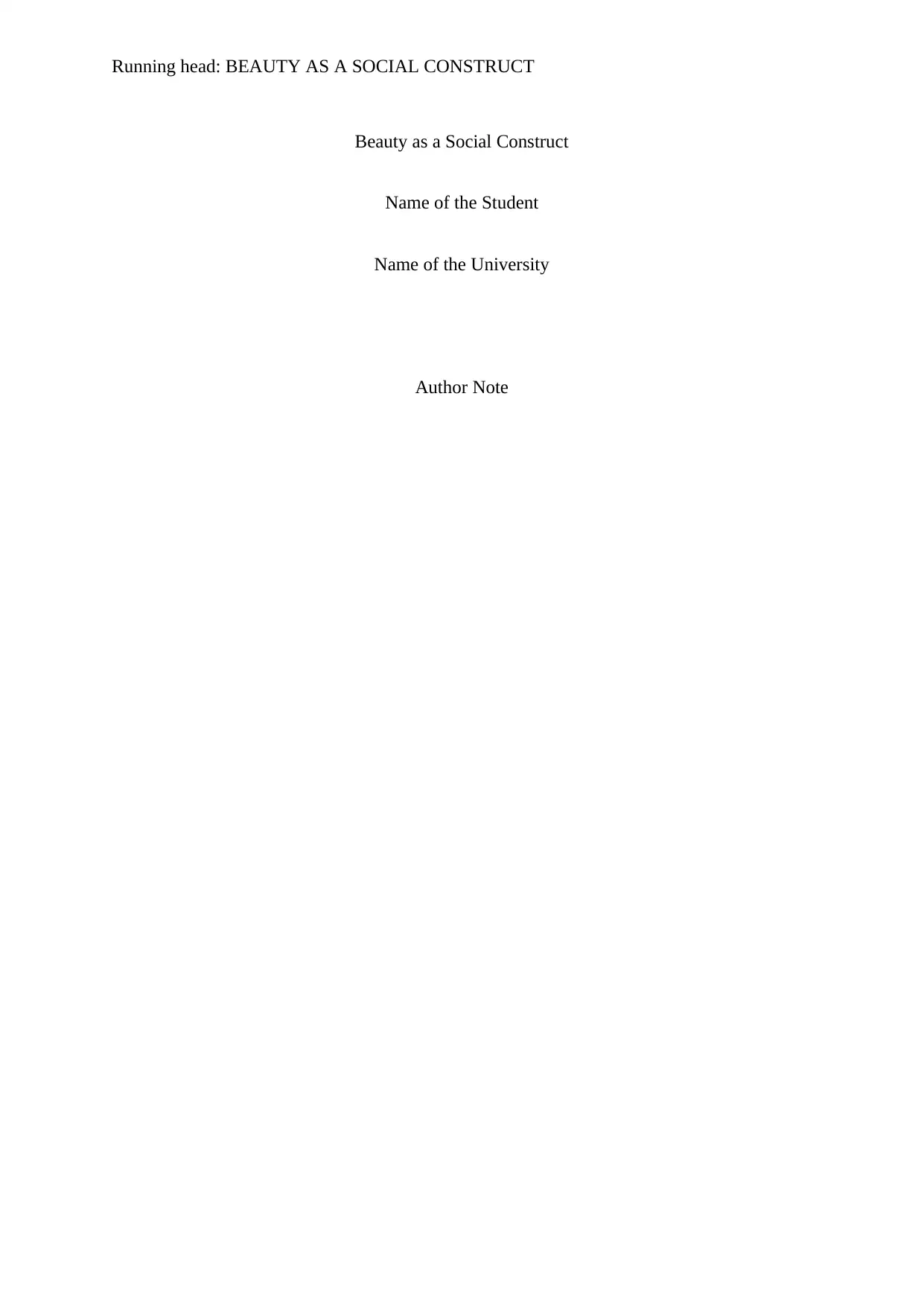
Running head: BEAUTY AS A SOCIAL CONSTRUCT
Beauty as a Social Construct
Name of the Student
Name of the University
Author Note
Beauty as a Social Construct
Name of the Student
Name of the University
Author Note
Secure Best Marks with AI Grader
Need help grading? Try our AI Grader for instant feedback on your assignments.
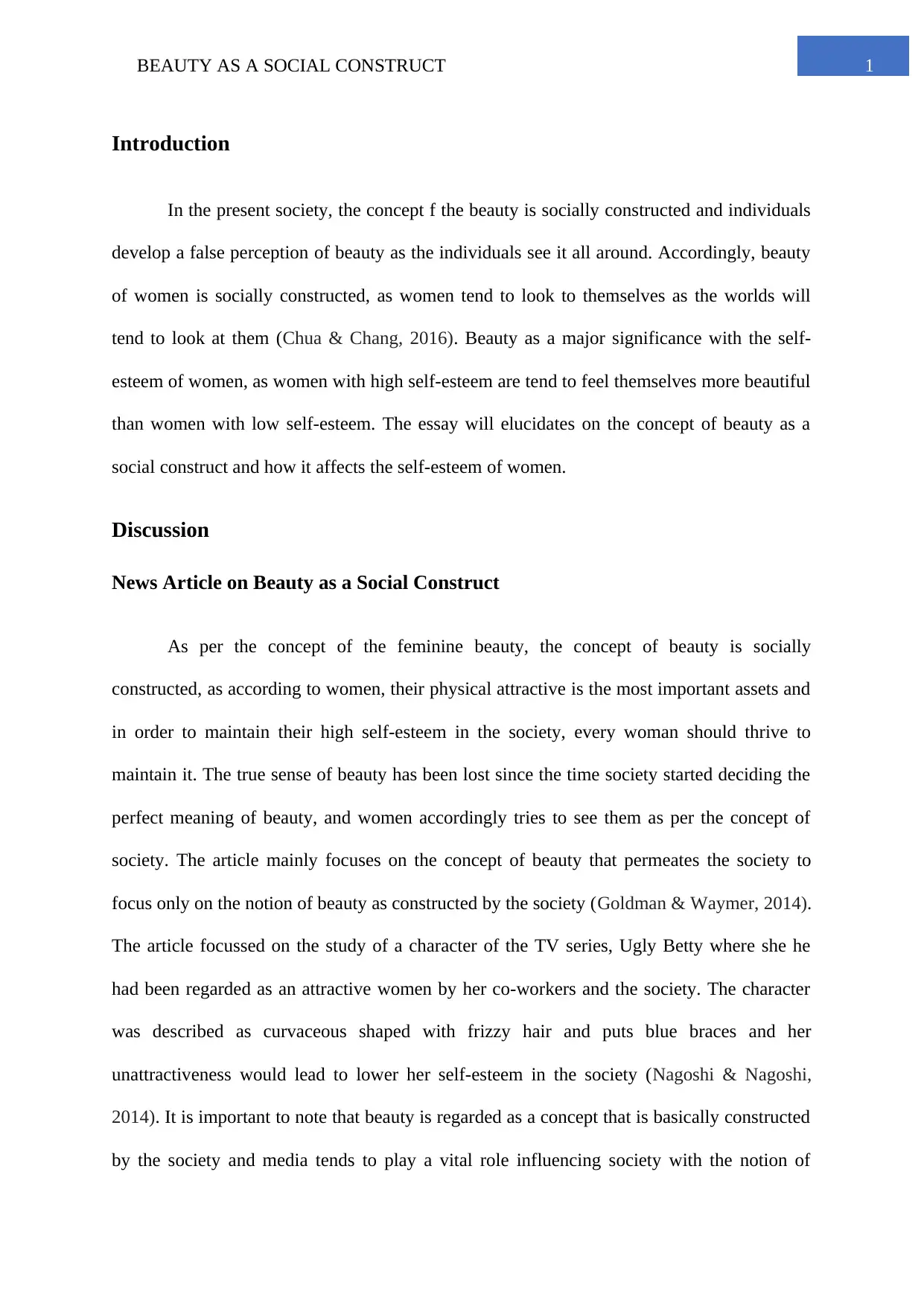
1BEAUTY AS A SOCIAL CONSTRUCT
Introduction
In the present society, the concept f the beauty is socially constructed and individuals
develop a false perception of beauty as the individuals see it all around. Accordingly, beauty
of women is socially constructed, as women tend to look to themselves as the worlds will
tend to look at them (Chua & Chang, 2016). Beauty as a major significance with the self-
esteem of women, as women with high self-esteem are tend to feel themselves more beautiful
than women with low self-esteem. The essay will elucidates on the concept of beauty as a
social construct and how it affects the self-esteem of women.
Discussion
News Article on Beauty as a Social Construct
As per the concept of the feminine beauty, the concept of beauty is socially
constructed, as according to women, their physical attractive is the most important assets and
in order to maintain their high self-esteem in the society, every woman should thrive to
maintain it. The true sense of beauty has been lost since the time society started deciding the
perfect meaning of beauty, and women accordingly tries to see them as per the concept of
society. The article mainly focuses on the concept of beauty that permeates the society to
focus only on the notion of beauty as constructed by the society (Goldman & Waymer, 2014).
The article focussed on the study of a character of the TV series, Ugly Betty where she he
had been regarded as an attractive women by her co-workers and the society. The character
was described as curvaceous shaped with frizzy hair and puts blue braces and her
unattractiveness would lead to lower her self-esteem in the society (Nagoshi & Nagoshi,
2014). It is important to note that beauty is regarded as a concept that is basically constructed
by the society and media tends to play a vital role influencing society with the notion of
Introduction
In the present society, the concept f the beauty is socially constructed and individuals
develop a false perception of beauty as the individuals see it all around. Accordingly, beauty
of women is socially constructed, as women tend to look to themselves as the worlds will
tend to look at them (Chua & Chang, 2016). Beauty as a major significance with the self-
esteem of women, as women with high self-esteem are tend to feel themselves more beautiful
than women with low self-esteem. The essay will elucidates on the concept of beauty as a
social construct and how it affects the self-esteem of women.
Discussion
News Article on Beauty as a Social Construct
As per the concept of the feminine beauty, the concept of beauty is socially
constructed, as according to women, their physical attractive is the most important assets and
in order to maintain their high self-esteem in the society, every woman should thrive to
maintain it. The true sense of beauty has been lost since the time society started deciding the
perfect meaning of beauty, and women accordingly tries to see them as per the concept of
society. The article mainly focuses on the concept of beauty that permeates the society to
focus only on the notion of beauty as constructed by the society (Goldman & Waymer, 2014).
The article focussed on the study of a character of the TV series, Ugly Betty where she he
had been regarded as an attractive women by her co-workers and the society. The character
was described as curvaceous shaped with frizzy hair and puts blue braces and her
unattractiveness would lead to lower her self-esteem in the society (Nagoshi & Nagoshi,
2014). It is important to note that beauty is regarded as a concept that is basically constructed
by the society and media tends to play a vital role influencing society with the notion of
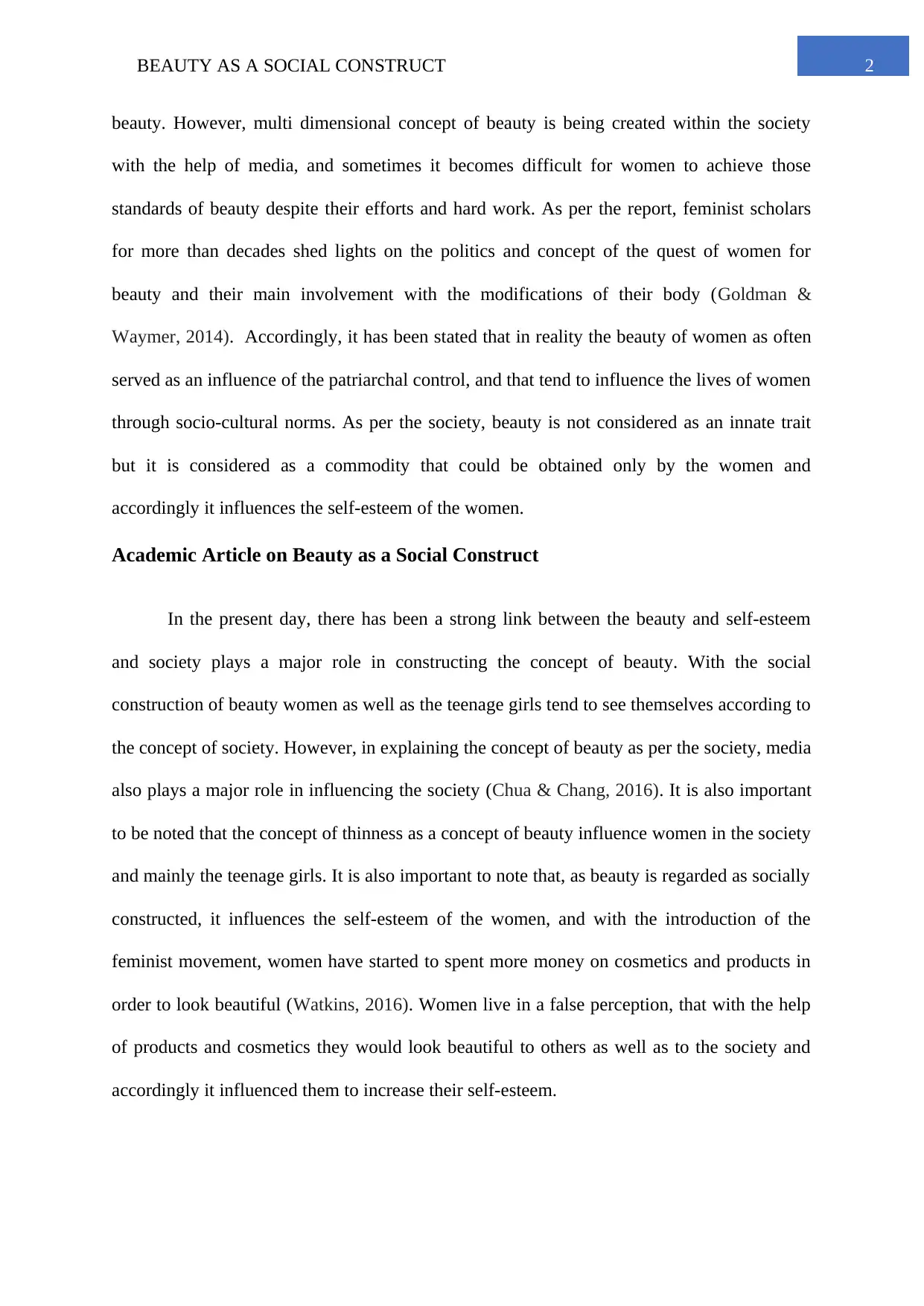
2BEAUTY AS A SOCIAL CONSTRUCT
beauty. However, multi dimensional concept of beauty is being created within the society
with the help of media, and sometimes it becomes difficult for women to achieve those
standards of beauty despite their efforts and hard work. As per the report, feminist scholars
for more than decades shed lights on the politics and concept of the quest of women for
beauty and their main involvement with the modifications of their body (Goldman &
Waymer, 2014). Accordingly, it has been stated that in reality the beauty of women as often
served as an influence of the patriarchal control, and that tend to influence the lives of women
through socio-cultural norms. As per the society, beauty is not considered as an innate trait
but it is considered as a commodity that could be obtained only by the women and
accordingly it influences the self-esteem of the women.
Academic Article on Beauty as a Social Construct
In the present day, there has been a strong link between the beauty and self-esteem
and society plays a major role in constructing the concept of beauty. With the social
construction of beauty women as well as the teenage girls tend to see themselves according to
the concept of society. However, in explaining the concept of beauty as per the society, media
also plays a major role in influencing the society (Chua & Chang, 2016). It is also important
to be noted that the concept of thinness as a concept of beauty influence women in the society
and mainly the teenage girls. It is also important to note that, as beauty is regarded as socially
constructed, it influences the self-esteem of the women, and with the introduction of the
feminist movement, women have started to spent more money on cosmetics and products in
order to look beautiful (Watkins, 2016). Women live in a false perception, that with the help
of products and cosmetics they would look beautiful to others as well as to the society and
accordingly it influenced them to increase their self-esteem.
beauty. However, multi dimensional concept of beauty is being created within the society
with the help of media, and sometimes it becomes difficult for women to achieve those
standards of beauty despite their efforts and hard work. As per the report, feminist scholars
for more than decades shed lights on the politics and concept of the quest of women for
beauty and their main involvement with the modifications of their body (Goldman &
Waymer, 2014). Accordingly, it has been stated that in reality the beauty of women as often
served as an influence of the patriarchal control, and that tend to influence the lives of women
through socio-cultural norms. As per the society, beauty is not considered as an innate trait
but it is considered as a commodity that could be obtained only by the women and
accordingly it influences the self-esteem of the women.
Academic Article on Beauty as a Social Construct
In the present day, there has been a strong link between the beauty and self-esteem
and society plays a major role in constructing the concept of beauty. With the social
construction of beauty women as well as the teenage girls tend to see themselves according to
the concept of society. However, in explaining the concept of beauty as per the society, media
also plays a major role in influencing the society (Chua & Chang, 2016). It is also important
to be noted that the concept of thinness as a concept of beauty influence women in the society
and mainly the teenage girls. It is also important to note that, as beauty is regarded as socially
constructed, it influences the self-esteem of the women, and with the introduction of the
feminist movement, women have started to spent more money on cosmetics and products in
order to look beautiful (Watkins, 2016). Women live in a false perception, that with the help
of products and cosmetics they would look beautiful to others as well as to the society and
accordingly it influenced them to increase their self-esteem.
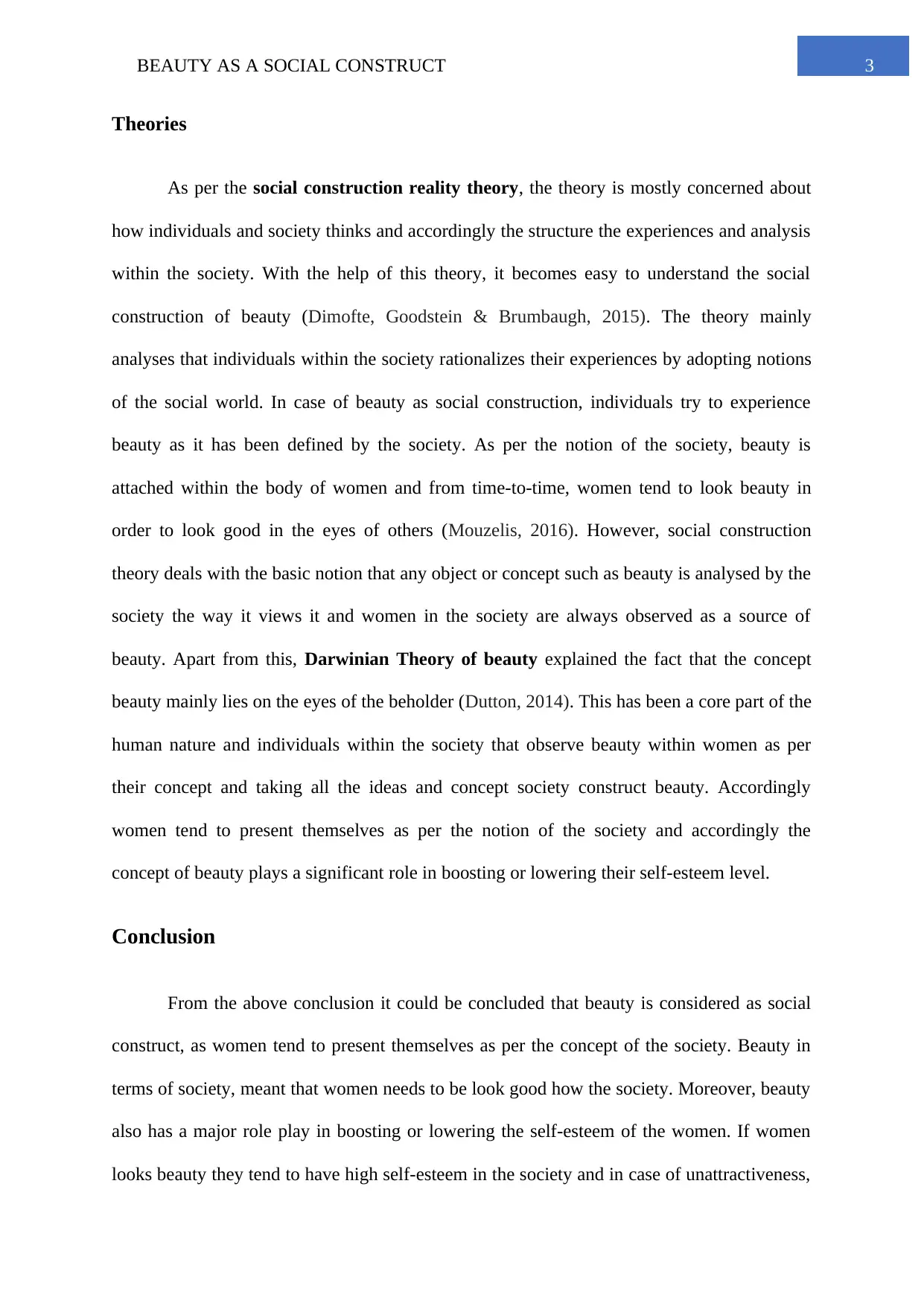
3BEAUTY AS A SOCIAL CONSTRUCT
Theories
As per the social construction reality theory, the theory is mostly concerned about
how individuals and society thinks and accordingly the structure the experiences and analysis
within the society. With the help of this theory, it becomes easy to understand the social
construction of beauty (Dimofte, Goodstein & Brumbaugh, 2015). The theory mainly
analyses that individuals within the society rationalizes their experiences by adopting notions
of the social world. In case of beauty as social construction, individuals try to experience
beauty as it has been defined by the society. As per the notion of the society, beauty is
attached within the body of women and from time-to-time, women tend to look beauty in
order to look good in the eyes of others (Mouzelis, 2016). However, social construction
theory deals with the basic notion that any object or concept such as beauty is analysed by the
society the way it views it and women in the society are always observed as a source of
beauty. Apart from this, Darwinian Theory of beauty explained the fact that the concept
beauty mainly lies on the eyes of the beholder (Dutton, 2014). This has been a core part of the
human nature and individuals within the society that observe beauty within women as per
their concept and taking all the ideas and concept society construct beauty. Accordingly
women tend to present themselves as per the notion of the society and accordingly the
concept of beauty plays a significant role in boosting or lowering their self-esteem level.
Conclusion
From the above conclusion it could be concluded that beauty is considered as social
construct, as women tend to present themselves as per the concept of the society. Beauty in
terms of society, meant that women needs to be look good how the society. Moreover, beauty
also has a major role play in boosting or lowering the self-esteem of the women. If women
looks beauty they tend to have high self-esteem in the society and in case of unattractiveness,
Theories
As per the social construction reality theory, the theory is mostly concerned about
how individuals and society thinks and accordingly the structure the experiences and analysis
within the society. With the help of this theory, it becomes easy to understand the social
construction of beauty (Dimofte, Goodstein & Brumbaugh, 2015). The theory mainly
analyses that individuals within the society rationalizes their experiences by adopting notions
of the social world. In case of beauty as social construction, individuals try to experience
beauty as it has been defined by the society. As per the notion of the society, beauty is
attached within the body of women and from time-to-time, women tend to look beauty in
order to look good in the eyes of others (Mouzelis, 2016). However, social construction
theory deals with the basic notion that any object or concept such as beauty is analysed by the
society the way it views it and women in the society are always observed as a source of
beauty. Apart from this, Darwinian Theory of beauty explained the fact that the concept
beauty mainly lies on the eyes of the beholder (Dutton, 2014). This has been a core part of the
human nature and individuals within the society that observe beauty within women as per
their concept and taking all the ideas and concept society construct beauty. Accordingly
women tend to present themselves as per the notion of the society and accordingly the
concept of beauty plays a significant role in boosting or lowering their self-esteem level.
Conclusion
From the above conclusion it could be concluded that beauty is considered as social
construct, as women tend to present themselves as per the concept of the society. Beauty in
terms of society, meant that women needs to be look good how the society. Moreover, beauty
also has a major role play in boosting or lowering the self-esteem of the women. If women
looks beauty they tend to have high self-esteem in the society and in case of unattractiveness,
Secure Best Marks with AI Grader
Need help grading? Try our AI Grader for instant feedback on your assignments.
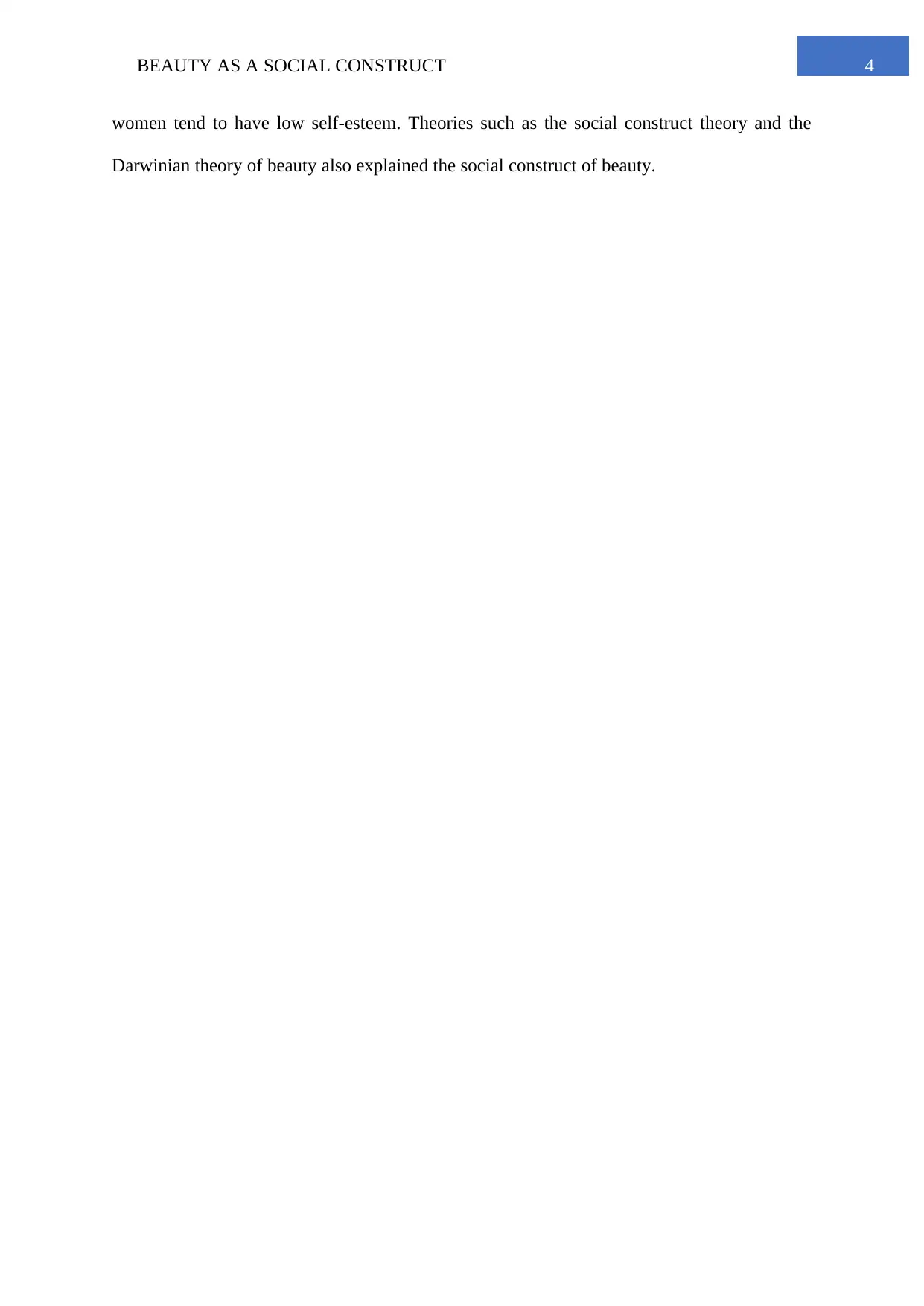
4BEAUTY AS A SOCIAL CONSTRUCT
women tend to have low self-esteem. Theories such as the social construct theory and the
Darwinian theory of beauty also explained the social construct of beauty.
women tend to have low self-esteem. Theories such as the social construct theory and the
Darwinian theory of beauty also explained the social construct of beauty.
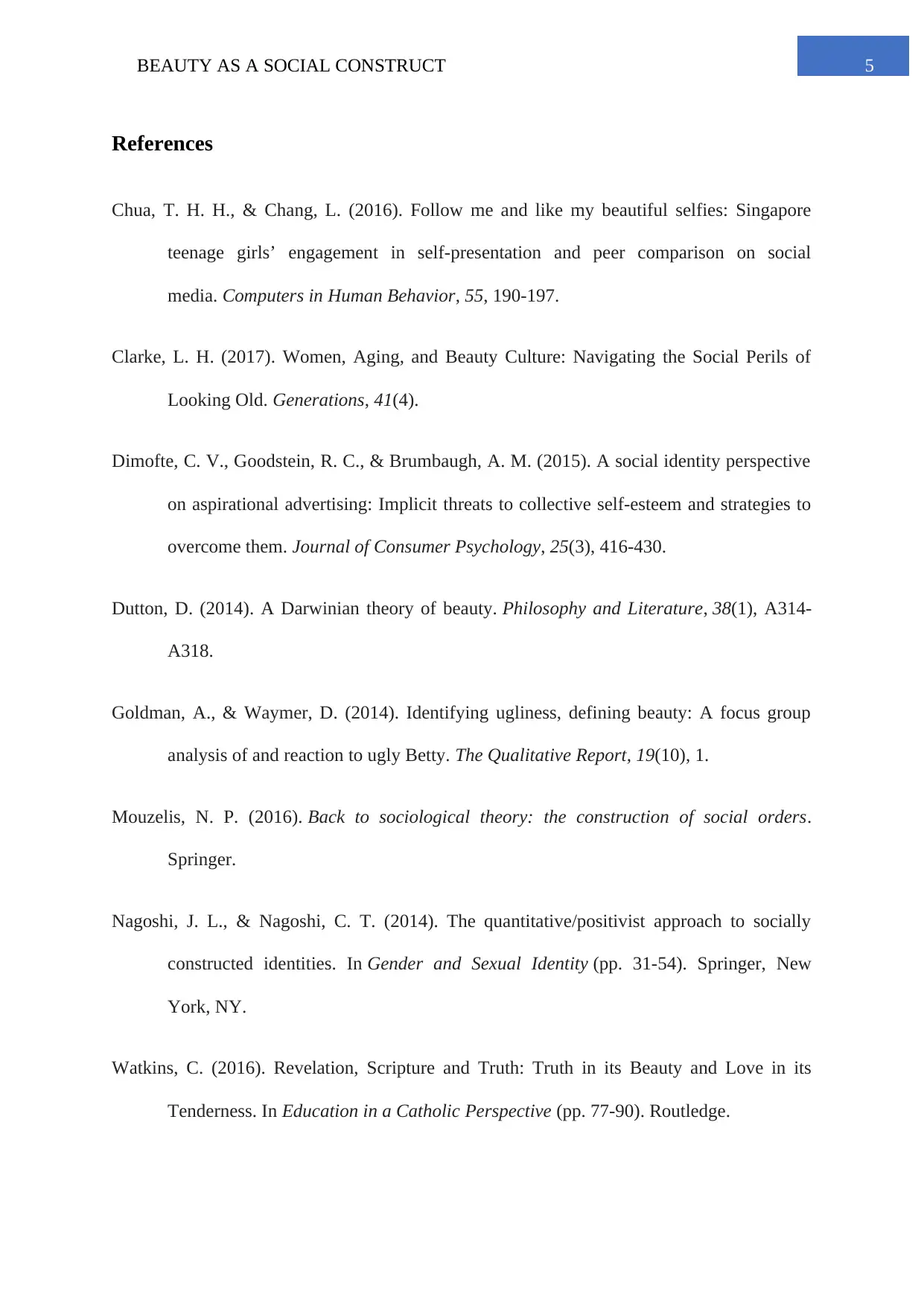
5BEAUTY AS A SOCIAL CONSTRUCT
References
Chua, T. H. H., & Chang, L. (2016). Follow me and like my beautiful selfies: Singapore
teenage girls’ engagement in self-presentation and peer comparison on social
media. Computers in Human Behavior, 55, 190-197.
Clarke, L. H. (2017). Women, Aging, and Beauty Culture: Navigating the Social Perils of
Looking Old. Generations, 41(4).
Dimofte, C. V., Goodstein, R. C., & Brumbaugh, A. M. (2015). A social identity perspective
on aspirational advertising: Implicit threats to collective self‐esteem and strategies to
overcome them. Journal of Consumer Psychology, 25(3), 416-430.
Dutton, D. (2014). A Darwinian theory of beauty. Philosophy and Literature, 38(1), A314-
A318.
Goldman, A., & Waymer, D. (2014). Identifying ugliness, defining beauty: A focus group
analysis of and reaction to ugly Betty. The Qualitative Report, 19(10), 1.
Mouzelis, N. P. (2016). Back to sociological theory: the construction of social orders.
Springer.
Nagoshi, J. L., & Nagoshi, C. T. (2014). The quantitative/positivist approach to socially
constructed identities. In Gender and Sexual Identity (pp. 31-54). Springer, New
York, NY.
Watkins, C. (2016). Revelation, Scripture and Truth: Truth in its Beauty and Love in its
Tenderness. In Education in a Catholic Perspective (pp. 77-90). Routledge.
References
Chua, T. H. H., & Chang, L. (2016). Follow me and like my beautiful selfies: Singapore
teenage girls’ engagement in self-presentation and peer comparison on social
media. Computers in Human Behavior, 55, 190-197.
Clarke, L. H. (2017). Women, Aging, and Beauty Culture: Navigating the Social Perils of
Looking Old. Generations, 41(4).
Dimofte, C. V., Goodstein, R. C., & Brumbaugh, A. M. (2015). A social identity perspective
on aspirational advertising: Implicit threats to collective self‐esteem and strategies to
overcome them. Journal of Consumer Psychology, 25(3), 416-430.
Dutton, D. (2014). A Darwinian theory of beauty. Philosophy and Literature, 38(1), A314-
A318.
Goldman, A., & Waymer, D. (2014). Identifying ugliness, defining beauty: A focus group
analysis of and reaction to ugly Betty. The Qualitative Report, 19(10), 1.
Mouzelis, N. P. (2016). Back to sociological theory: the construction of social orders.
Springer.
Nagoshi, J. L., & Nagoshi, C. T. (2014). The quantitative/positivist approach to socially
constructed identities. In Gender and Sexual Identity (pp. 31-54). Springer, New
York, NY.
Watkins, C. (2016). Revelation, Scripture and Truth: Truth in its Beauty and Love in its
Tenderness. In Education in a Catholic Perspective (pp. 77-90). Routledge.
1 out of 6
Related Documents
Your All-in-One AI-Powered Toolkit for Academic Success.
+13062052269
info@desklib.com
Available 24*7 on WhatsApp / Email
![[object Object]](/_next/static/media/star-bottom.7253800d.svg)
Unlock your academic potential
© 2024 | Zucol Services PVT LTD | All rights reserved.





